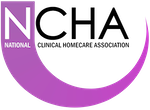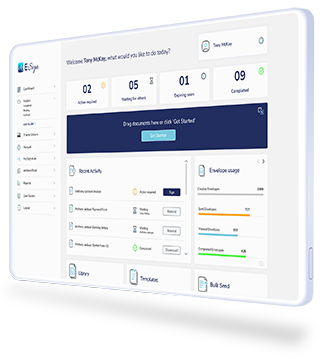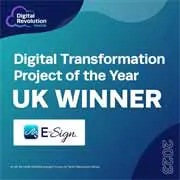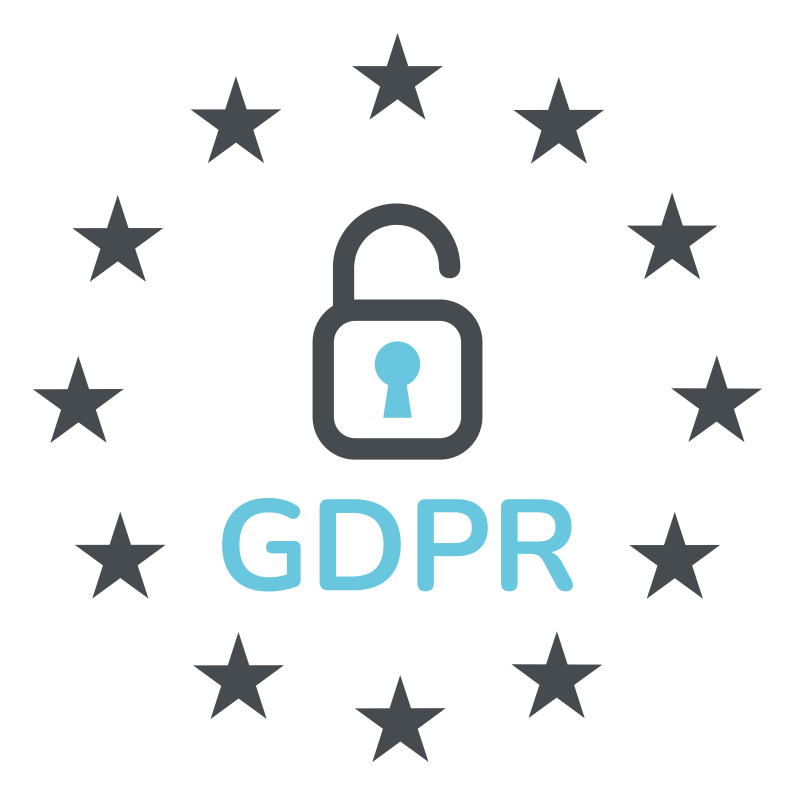Legality of Electronic Signatures
E-Sign's electronic signature platform incorporates all the legal requirements worldwide, to ensure your documents can be signed and completed, anywhere in the world.

Trusted By
E-Sign Legality Guide
Are Electronic Signatures Legal?
Electronic signature transactions are a recognised and legally binding method of nearly all business and personal document transactions within the UK and around the world.
Legislative requirements for electronic signatures
A legally binding advanced electronic signature must meet the following requirements:
- It is Uniquely Linked to the Signatory
- It is Capable of Identifying the Signatory
- It is create using means that the signatory can maintain under their sole control; and it is linked to the data to which it relates in such a manner that any subsequent change of the data is detectable.

United Kingdom
Within the UK, E-Signs digital signature solution complies with the definition of an electronic signature under the Electronic Communications Act 2000.

European Union
Regulation (EU) No 910/2014 on electronic identification and trust services for electronic transactions, commonly known as eIDAS, took direct effect in EU member states from 1 July 2016. It established a EU-wide legal framework for electronic signatures. E-Sign’s digital signature solution is compliant with eIDAS and EU electronic signature technical standards. E-Sign is also compliant with GDPR.

United States of America
E-Sign’s digital signature solution complies with the definition of an e-signature under the Electronic Signatures in Global and National Commerce (ESIGN) Act, the Uniform Electronic Transactions Act (UETA) and the Digital Signature and Electronic Authentication Law. ESIGN Act (2000) addresses e-signatures and e-records, allowing for electronic signatures in all 50 states when federal law applies. It defines an e-signature as an electronic sound, symbol, process attached to or logically associated with a document and executed or adopted by an individual with the intent to sign and be legally bound. E-Sign also complies with the Uniform Electronic Transactions Act (UETA, 1999)

How eSign Complies with Electronic Signature Law
Unlike a handwritten signature, which is generally the same mark on every document, E-Sign’s digital signature is 100% unique to every document.
Signers identity is established by:
- Email Address
- IP Adress
- Location
- Time and Date Stamping
- Web Browser and System Information

Secure and Legal
eSign's Secure Digital Signature
eSign provides the following within its digital signature to ensure every document that is sent is secure and legally admissible:
- Digital certificate authenticating all data and document interaction
- Time and date stamping
- Detailed document audit trail from inception to completion
- Document integrity maintained and checked throughout the signature process
- Secure storage of documents and data
- Identification of users verified
- Unique digital fingerprint created for every signed document
- Unique signature fingerprint created for signatory

Helpful resources
Still want to know more about Digital eSignatures?
For more information on the legislations eSign are compliant with, the following resources are helpful:
- The Electronic Signatures Regulations 2002
- The Law Society – Execution of a document using an electronic signature
- Part 11, Electronic Records; Electronic Signatures – Scope and Application
- Execution of deeds – electronic signatures
- CFR Compliance with Electronic Signatures
- Quality and ISMS Policy
- Conveyancer-certified eSignatures
- HIPAA Compliant Electronic Signatures

Frequently Asked Questions
What Industries Commonly Use eSignatures?
eSignatures are commonly used across a wide range of industries, including:
- Real estate: For signing contracts and closing deals remotely.
- Legal: For signing agreements, affidavits, and other legal documents.
- Healthcare: For patient consent forms and, digital prescriptions and medical records.
- Financial services: For loan agreements, account opening, and compliance documents.
- Human resources: For employment contracts, onboarding documents, and employee consent.
What Makes an eSignature Legal and Enforceable?
For an eSignature to be legally valid and enforceable, it must meet specific criteria:
- Intent to sign: The signer must intend to sign the document electronically.
- Consent to conduct business electronically: All parties must agree to use electronic signatures.
- Association of the signature with the record: The electronic signature must be linked to the document or transaction.
- Record retention: The signed document must be stored in a way that is accessible and reproducible.
Can I Use eSignatures for All Types of Documents?
While eSignatures are widely accepted for most business and legal documents, there are some exceptions. In the U.S., documents such as wills, trusts, and certain court documents may still require a physical signature. Always check local laws and consult legal professionals if you’re unsure about the enforceability of an electronic signature for a particular document.
Can I Use an eSignature for International Business Transactions?
Yes, eSignatures are widely accepted in international business transactions. Countries like the U.S., EU member states, Canada, Australia, and others have legislation in place to recognise and enforce electronic signatures in cross-border agreements. However, always verify the legal requirements in both countries to ensure compliance.
Are Electronic Signatures Legally Binding?
Yes, electronic signatures are legally binding in many countries, including the United States under the ESIGN Act and the UETA, and in the UK and European Union under the eIDAS Regulation. These laws ensure that eSignatures hold the same legal weight as traditional handwritten signatures, provided certain conditions are met.
Can I Sign a PDF Document Electronically?
Yes, you can easily sign PDF documents using electronic signature platforms. E-Sign integrates directly with PDF readers and offer the ability to securely sign, track, and manage signed PDFs.
How Do I Verify the Validity of an eSignature?
The validity of an eSignature can be verified through various methods:
- Audit trails: Many eSignature platforms provide a detailed log of actions taken during the signing process, such as time stamps, IP addresses, and email confirmations.
- Certificate-based digital signatures: Some documents may include a digital certificate from a trusted third party to verify the authenticity of the signature.
- Authentication: Signers may be required to authenticate their identity through methods such as email, phone, or biometric verification.
Are Electronic Signatures Admissible in Court?
Yes, electronic signatures are generally admissible in court as long as they meet the legal requirements under the applicable laws, such as the ESIGN Act or eIDAS. Courts typically look for evidence of the signer’s intent, consent, and the security measures used to validate the signature.




























